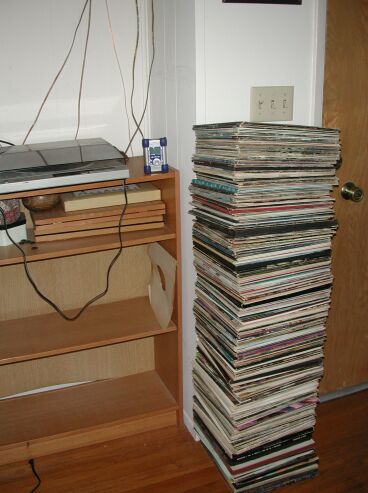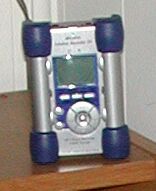The Process
First two words for Audiofiles: Go Away.
This will just make you froth at the mouth. We're talking
about real records here, not the kind you have. My records were
played under less than ideal conditions, on less than perfect equipment,
and so are in less than mint condition to start with.
- Record a batch of disks, one MP3 per disk is the most convenient.
Start 'em spinning and try to remember to flip 'em over in a half
hour or so. If your disk skips, improvse and scribble notes.
Give multiple disks in an album sequential names; aa ab ac.
Give sequential albums sequential names; aa bb cc. Long
before you get to zz you'll be impatient to start phase 2.
- Copy the newly recorded disks to your computer and immediately
give them more meaningful names, working sequentially through the stack
of albums you've processed.
- Use a tool like Mp3DirectCut
to trim the needle drops and side flips, rejoin classical pieces that
were split acoss disks, and so on. I also recommend equalizing the
volume using a tool like mp3gain.
Output clean MP3s ready to be played. Classical music is
more time consuming because it seems necessary to restore individual
pieces, no matter how they were packed or split among disks.
- Add track ID, performer, composer etc to the MP3s.
Depending on how anal you are, you can use MP3DirectCut for this
too, or MusicMatch or any number of other tools. Here again,
classical can be a lot more time consuming than pop.
Optional!
- A quick rinse (just run water over the disk and dry it) really
does help. Some horribly scratchy disks become bearable after a 1
minute massage.
- Preserve cover art, liner notes, etc, either physically or by
scanning. Lots more time!
- This whole process works equally well for casette tapes - and
unlike records, tapes do get worse just by sitting there.
Not Included!
- Except for tests, don't bother copying stuff back to the recorder
until you are really, really done.
- I see no reason to burn CDs, at least for 95% of the stuff I
still won't listen to very often. Playing things back directly from the
recorder is pretty convenient, if not as simple a pulling Cds from
shelves.
- Except for the truely irreplacable recordings, elaborate repair
is not called for. If you can't bear the pops and surface noise,
buy CDs (or downloadble MP3s)
- Be selective; some of those old disks, no one will ever want to
hear again anyway.
Final Notes
- Watch your record level! Archos recorder doesn't have
enough "low end" on the record level control, so you have to crank it
way down from the default to avoid peak limiting. If your MP3's
sound like they are being played through a cheap boom box, this is your
problem. Watch for peaks clipping off the top in DirectCut,
and listen for junky sound when the volume peaks.
- Preserve your "raw" mp3s until you have listened to the final
result. You will make
silly mistakes while bulk processing, and sometimes the best way to
recover is to go back to the original recording.. It's much
easier than re-spinning the disks to fix your editing errors.
Maintain a permanant copy of your perfect MP3s on hard drive
and/or DVDs. Remember, when your music collection was physical, nothing
short of a major fire could do much damage. Now that it is
electronic, any single copy could disappear instantly in any number of
ways.
- Sell your turntable and tape deck on Ebay. If you had good
equipment, you might even pay for your recorder.
- Store your old albums in your garage until you've sold your
turntable, "just in case".
- Reclaim a lot of prime shelf and storage space. Fill with
electronic gadgets and DVDs.
- While 5 minutes per disk processing time may not sound too bad,
(multiply by 400 disks and you get 33 hours) - but recording time
(400 times 40 minutes is 260 hours) is. Divide by the number
of hours per day you will find it convenient to spin disks - even as a
background task - and we have a long term project here.



